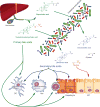Understanding the Holobiont: How Microbial Metabolites Affect Human Health and Shape the Immune System
- PMID: 28625867
- PMCID: PMC5535818
- DOI: 10.1016/j.cmet.2017.05.008
Understanding the Holobiont: How Microbial Metabolites Affect Human Health and Shape the Immune System
Abstract
The human gastrointestinal tract is populated by a diverse, highly mutualistic microbial flora, which is known as the microbiome. Disruptions to the microbiome have been shown to be associated with severe pathologies of the host, including metabolic disease, cancer, and inflammatory bowel disease. Mood and behavior are also susceptible to alterations in the gut microbiota. A particularly striking example of the symbiotic effects of the microbiome is the immune system, whose cells depend critically on a diverse array of microbial metabolites for normal development and behavior. This includes metabolites that are produced by bacteria from dietary components, metabolites that are produced by the host and biochemically modified by gut bacteria, and metabolites that are synthesized de novo by gut microbes. In this review, we highlight the role of the intestinal microbiome in human metabolic and inflammatory diseases and focus in particular on the molecular mechanisms that govern the gut-immune axis.
Keywords: atherosclerosis; commensals; indole; inflammatory bowel disease; metabolic syndrome; microbiome; obesity; polyamine; polysaccharide A; short-chain fatty acids.
Copyright © 2017 Elsevier Inc. All rights reserved.
Figures



References
-
- Alex S, Lange K, Amolo T, Grinstead JS, Haakonsson AK, Szalowska E, Koppen A, Mudde K, Haenen D, Al-Lahham S, Roelofsen H, Houtman R, van der Burg B, Mandrup S, Bonvin AMJJ, Kalkhoven E, Müller M, Hooiveld GJ, Kersten S. Short-chain fatty acids stimulate angiopoietin-like 4 synthesis in human colon adenocarcinoma cells by activating peroxisome proliferator-activated receptor γ. Molecular and Cellular Biology. 2013;33:1303–1316. doi: 10.1128/MCB.00858-12. - DOI - PMC - PubMed
-
- Are A, Aronsson L, Wang S, Greicius G, Lee YK, Gustafsson J-A, Pettersson S, Arulampalam V. Enterococcus faecalis from newborn babies regulate endogenous PPARgamma activity and IL-10 levels in colonic epithelial cells. Proceedings of the National Academy of Sciences. 2008;105:1943–1948. doi: 10.1073/pnas.0711734105. - DOI - PMC - PubMed
Publication types
MeSH terms
Grants and funding
LinkOut - more resources
Full Text Sources
Other Literature Sources
Medical

